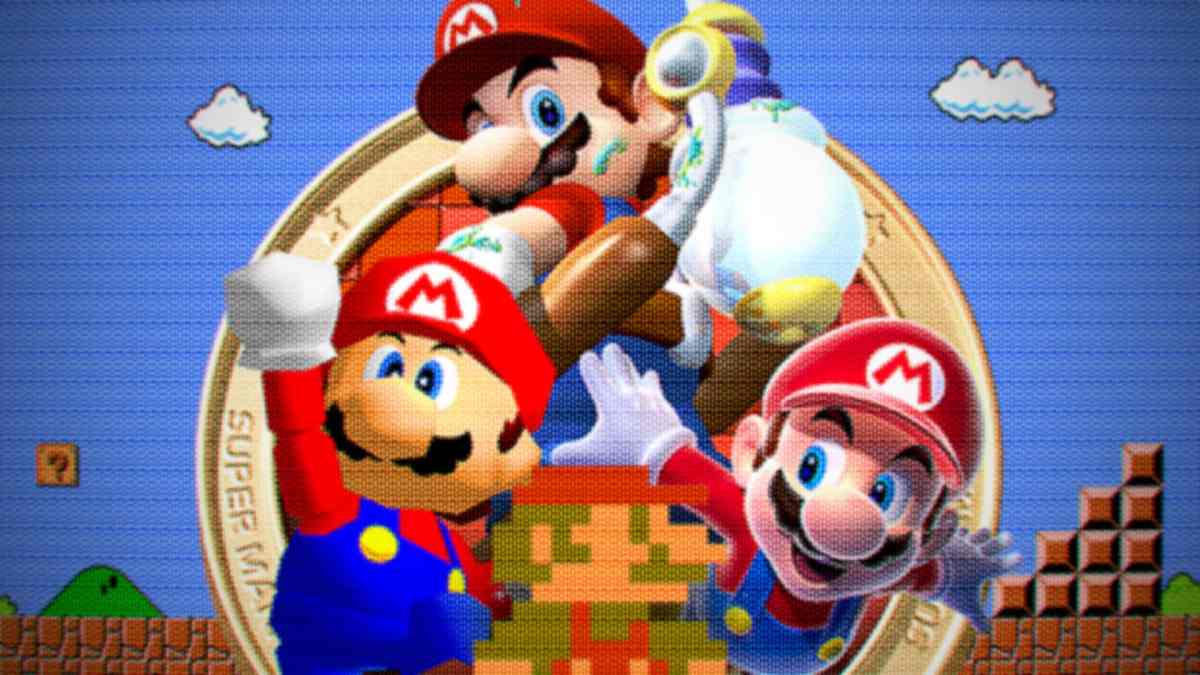A confession: I was that annoying kid who hogged the controller.
I played Donkey Kong Country 2 on my friend’s Super
On family holidays, I woke up early to speed through Mario Kart on my cousin’s
Decades on, I’m still playing the same games, often on their original consoles. When
As fun as these retro games may have been at the time, how is it possible that we can keep playing them year after year – decade after decade? Why do we spend near-infinite hours in these worlds we know like the back of our controller-clutching hands?
When we finish a book, we might read it again – only if we’re willing to invest more time in its predictable plot. We rewatch our favourite films, though it’s easy to get over them once we’ve memorised the script (The Lord of the Rings is the exception, right?).
Yet people who play video games are happy to invest thousands of hours into the same-old styles of gameplay over the course of their lives. So why aren’t we all sick of Mario by now? Why aren’t we put off by outdated graphics? And why have we accepted that these franchises are simply part of our lives, and here to stay?
More than just a game
The joy of gaming is conducive to nostalgia. When we grip the controller, we’re drawn back to the moments from our childhoods in which everything could be okay. Sure, we faced challenges (save the princess, collect the coins). But we overcame them with lightning-quick reaction speeds, and clever strategies that would shape our growing minds. Back in the ’80s and ’90s, there was no easy way past a difficult level, so we persisted. We became stronger. We tested our endurance; built our resilience. And we did it all in a safe space, laughing with our friends or playing peacefully on our own.
Brittany Cleaver is a casual gamer from Tasmania who, when asked about the earliest titles she played, described them as ‘games that shaped my childhood’ – a nod to the deeper role of gaming in our histories; they are not a passive experience. Brittany was just eight years old when she started playing Pokémon Blue Version, then newly released on Game Boy. She also recalls working her way through favourites such as Super Mario 64, and classics from the Banjo-Kazooie and Super Smash Bros. franchises.
For players like Brittany, it was never just about the game.
‘Games were a huge bonding experience for me and my brothers,’ she says.
While in her 20s, Brittany spent about five years living and teaching in Japan – the home of her favourite consoles, but a home far away from her brothers. So, she bought herself an old
‘The joy of finding second-hand Japanese N64 games, and playing my old favourites in a new environment, gave me a sense of calm and enjoyment that I really needed at that time,’ Brittany says.
Years later, she’s returned to live in her hometown of Hobart, where she works on her debut fantasy novel, crafting new worlds to rival those of the games she once played. While she now owns a
‘Playing nostalgic games with family and friends gives us a snapshot of an older, simpler time,’ she says.
‘It’s fun to revisit games that you may not have been able to finish, or to challenge a sibling that you always lost to as a child. It always brings out childlike excitement to talk about old video games with my adult siblings.’
Experiencing a technological revolution
Matt Boden is a casual gamer and commercial musician from Tasmania. Involved in composition and music preparation for film and TV, he also works as a tertiary educator – training up Australia’s next generation of film and game composers.
Matt uses the latest technologies to fuel his creative work. And it’s not hard to speculate on the source of his enthusiasm: when Matt was 8 years old, his dad ‘brought home a then-top-of-the-line 386SX PC’. This also spawned an early love of gaming.
‘This thing was super exciting – we were playing F-15 Strike Eagle on it, and a few other MicroProse games from the early days,’ Matt shares.
Some of his favourite PC games were The Magic Candle, Dark Castle, and Space Quest III. And with a friend who owned a Macintosh Classic II, Matt recalls being ‘totally into all of this new tech – both the gaming, and the maintenance of the machines’.
‘The early days were fantastic, and as the tech developed and more friends got involved, LAN parties were a big thing,’ he says.
‘Getting a few friends together and trying to get a network happening so you could play StarCraft or DOOM together was heaps of fun […] Just getting the damn thing up and running, and the computers talking to each other, was as enjoyable as the games themselves.’
Matt remains loyal to the PC – his preferred gaming medium since childhood. He’ll occasionally return to beloved titles such as Age of Empires II – a ‘great example of a well-balanced and superbly engineered game’.
‘I think the strategy development – and the endless combination of opening moves, tech trees, and long form strategy – are a key to keeping me interested in these games.’
Familiarity is a drawcard for Matt. ‘When you know your way around the upgrades, it becomes easier to try new things.’ With a touch of irony (he doesn’t consider himself a retro ‘console gamer’), Matt now owns a
‘Mario Kart is a brilliantly balanced game, and it’s the social aspect of burning around tracks with friends that marks it out as special,’ he says.
‘The old tracks have a touch of nostalgia, but really, that series has been so damn consistent that it draws you back in. So much fun, and so frustrating in equal measure – the perfect combo.’
To Matt, who keeps up to date with new games and technologies, there’s still something to be said about staying loyal to retro games when ‘many of them still stack up in terms of gameplay and replayability’.
A risky business for game developers
When thinking about why we stay loyal to retro games, I wanted to understand a bit about the industry – in particular, how it responds to casual players’ behaviours of repeated gameplay and lifelong loyalty to a franchise.
So I went straight to the source: I asked GamesHub editor Edmond Tran to share his thoughts on the topic. Edmond has spent most of his life covering the games industry; he was an award-winning video producer at GameSpot before becoming its Australian editor, and then became the managing editor of GamesHub (which recently won for Best Gaming Coverage at the 2023 Samsung Australian IT Journalism Awards.)
But before all that, Edmond was hooked on pure play.
‘Gaming was my primary hobby growing up,’ he shares. Like Brittany, he grew up with an older brother who introduced him to games; like Matt, he was raised on PC, and played Space Quest, Quest for Glory, and Police Quest on a 386DX.
When asked if he feels game producers may play on nostalgic appeal, Edmond says it comes down to three things: ‘Money, money, money.’ After all, why should a player spend money on a new game when they could stick with a trusted title? I certainly watch plenty of videos, and read a lot of reviews, before making the decision to spend upwards of AU $70 on a new game for my own collection.
‘When you’re talking about the broader market of people who play games – not just enthusiasts – they are definitely far more averse to something new,’ Edmond observes. ‘Games are expensive compared to buying a film, or just hopping on a streaming service, so there is some trepidation there for your average person.’
Gamers are not the only ones who may avoid risk. According to Edmond, it’s embedded in the culture of the industry. ‘There’s a lot of good stuff happening in the independent space, of course – but those that engage with that realm are usually enthusiasts who are more willing to experiment and take a chance,’ he says.
‘Of course, they’re dwarfed by your big franchises in the grand scheme of things. They can still be successful, but if you look at the list of biggest-selling games in the past years, there are a lot of recognisable names on there.’
And he’s right: in 2022, Grand Theft Auto 5 found its way to the top of Australia’s game charts, almost a decade after the instalment’s original release; the GTA series began back in 1997. Other best-selling games through the seasons of 2022 were overwhelmingly linked to retro franchises, with Pokémon, Mario, and Zelda games dominating
Some of this year’s biggest launches continue the legacy of retro gaming, too. New Zelda, Street Fighter, and Final Fantasy titles are represented among a list of ‘major releases, from the biggest video game companies in the world‘ (alongside games that expand upon the worlds of classic films – Star Wars, The Lord of the Rings, and Avatar, for instance).
It’s not all DOOM and gloom (the pun was inevitable). For one thing, Edmond finds a positive in the fact that ‘several developers tend to innovate within the same properties – Mario, for example. Resident Evil is another good one – they’re essentially revisiting their history in a completely new genre format, and doing a great job of it.’
‘A new narrative would be great, but the mechanical experience is exceptional.’
Then there’s the benefit of remasters, which can function as a ‘preservation exercise’ for retro games – a sustainable option for casual and serious players who want to continue engaging with their favourite titles, decades after the original console was released (and grew sun-bleached and covered in dust).
‘As technology advances, access to old games goes away, and that’s bad news for the history of games! Remasters bring that stuff to a new audience,’ Edmond also notes.
While Edmond has a ‘very strong affinity’ for the adventure games he grew up with, he also appreciates ‘exciting new original stories being told’ – such as those from indie developers like Wadjet Eye Games, which often takes inspiration from the classics of the genre.
‘I typically find myself getting excited about particular studios or individual designers coming out with new games – whether it be an original or not.’
At the end of the day, it doesn’t really matter what you play – as long as you’re having fun, bonding with your friends, improving your focus, or increasing your brain’s grey matter.
‘Also,’ Edmond adds, ‘if I can’t use my decades of experience on Mario Kart and Street Fighter to keep beating people online well into middle age, well, then a good chunk of my life would have been for nothing, and I don’t think I can handle that.’





